Time to look back at some of the highlights of the year with five picks. It’s a chance to celebrate some great sport and also to apply some precious hindsight.
Here it’s not one race but a day, Sunday 14 March.
Paris-Nice and Tirreno-Adriatico have a lot in common as week-long stage races, they’re prestigious, well-organised, have varied terrain from the plains to ski station summit finishes, cross their host countries and act as pre-classics training blocks. They also share the same spot on the calendar.
Weekend television audiences tend to be larger and more valuable. Paris-Nice finishes on a Sunday and has hit on the box office formula of lively finale in the hills behind Nice. Tirreno-Adriatico has always finished mid-week (this changes in 2022) but typically placed its best stages on the weekend too.
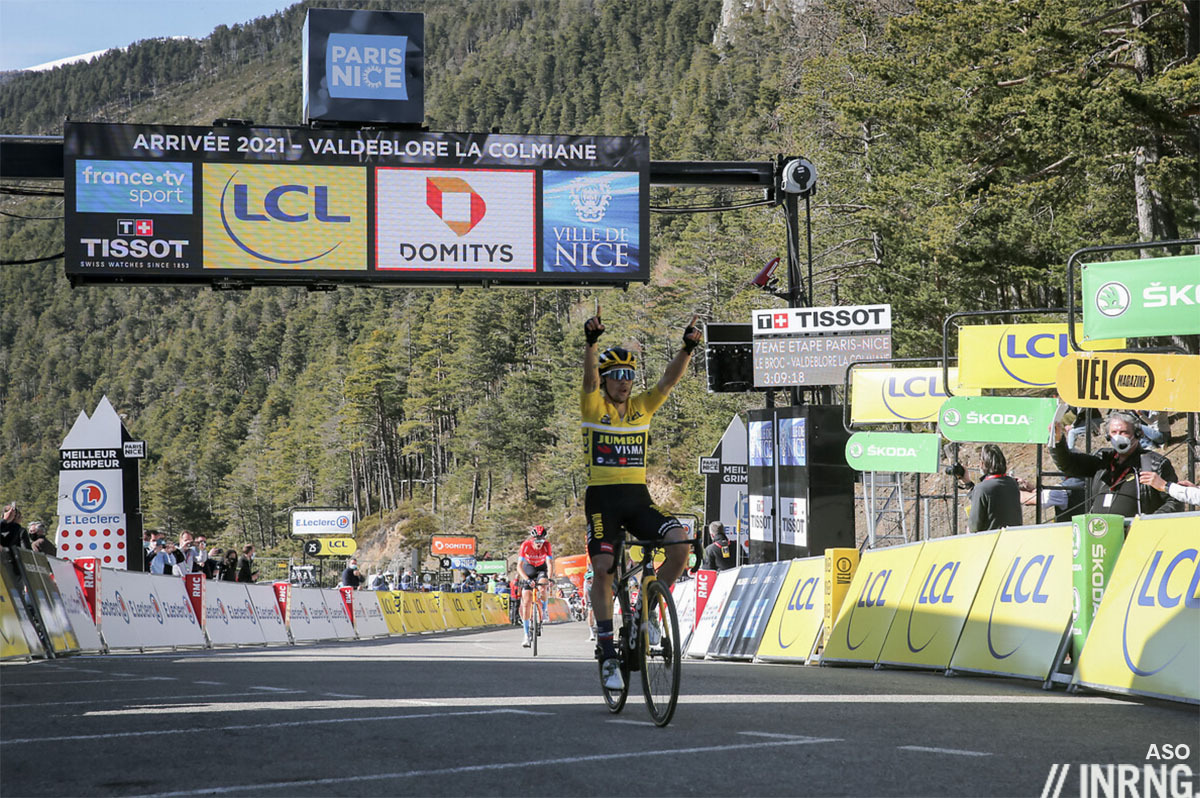
This year, on that weekend, it was summit finish Saturday. We’d seen Primož Roglič win the summit finish at La Colmiane with a predatory move that chased down Gino Mäder to take the stage and the time bonuses. Roglič had already won two stages in the week and was leading overall but this late surge saw him move almost a minute clear on GC with one stage remaining. So the final stage began to look more like a victory parade than a thriller.
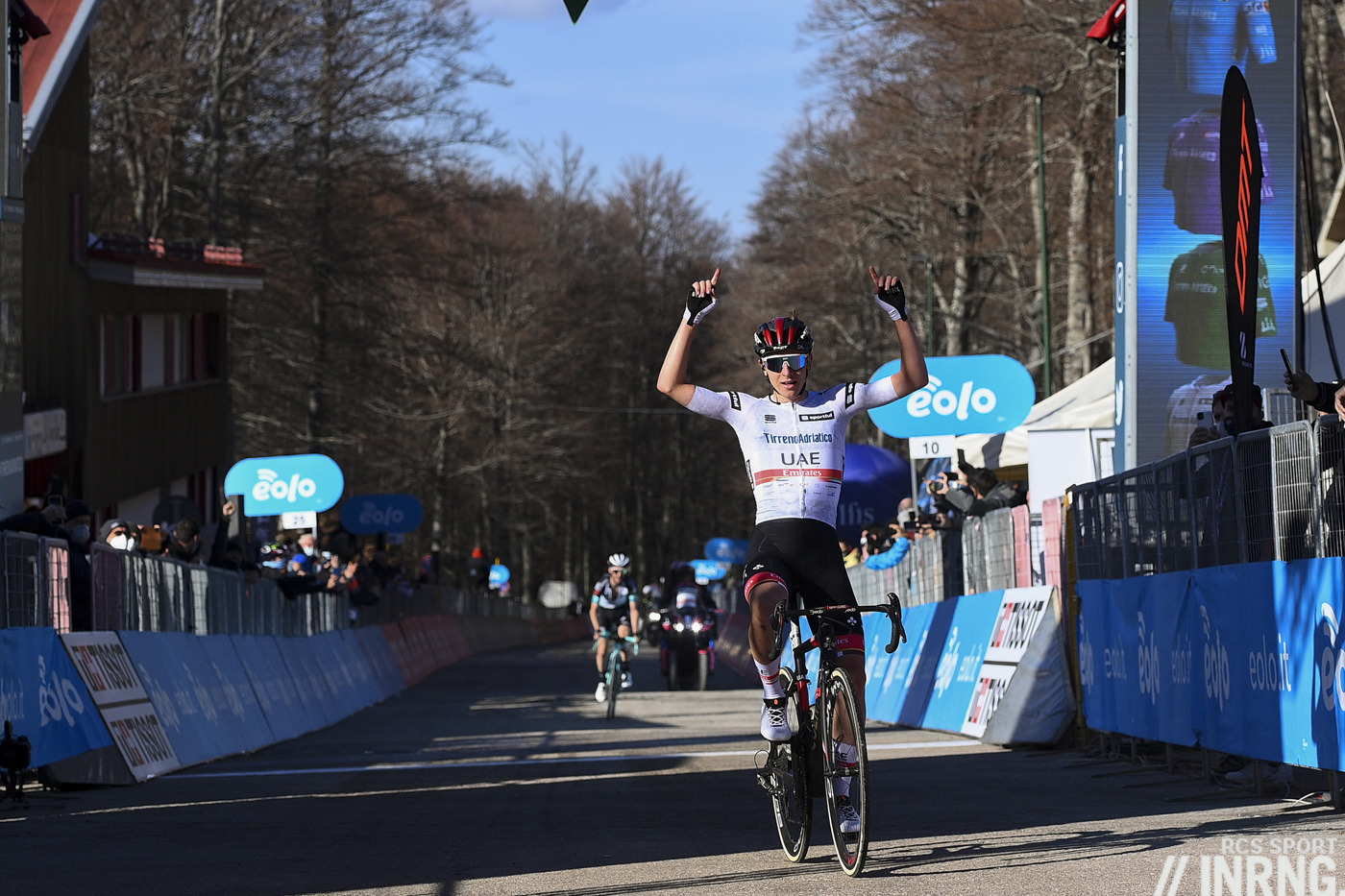
Meanwhile in Italy Tadej Pogačar had taken a solo win on the Saturday at Prati di Tivo, just though, holding off Simon Yates and enough to put him in the overall lead with over 35 seconds on Wout van Aert who was showing the climbing ability we’d later see on Mont Ventoux. It made for a good Saturday’s sport.
Sunday was better. Tirreno-Adriatico’s Stage 6 opted for a dash up the Adriatic coast and then a series of laps around Castelfidardo in the Marche with the “wall” climb, a stage backloaded with 2,700m of vertical gain. It was a cold day by the sea and once on the hillier laps moves started, including Egan Bernal. Just as Mathieu van der Poel looked to be taking in some food… he attacked, seemingly with his mouth full. There were 50km to go and not a quiet minute. First riders tried to chase, then towards the end van der Poel legs turned to cotton wool and he just held off Pogačar for the stage win, with van Aert third at 49s and Egan Bernal fifth over two minutes down.
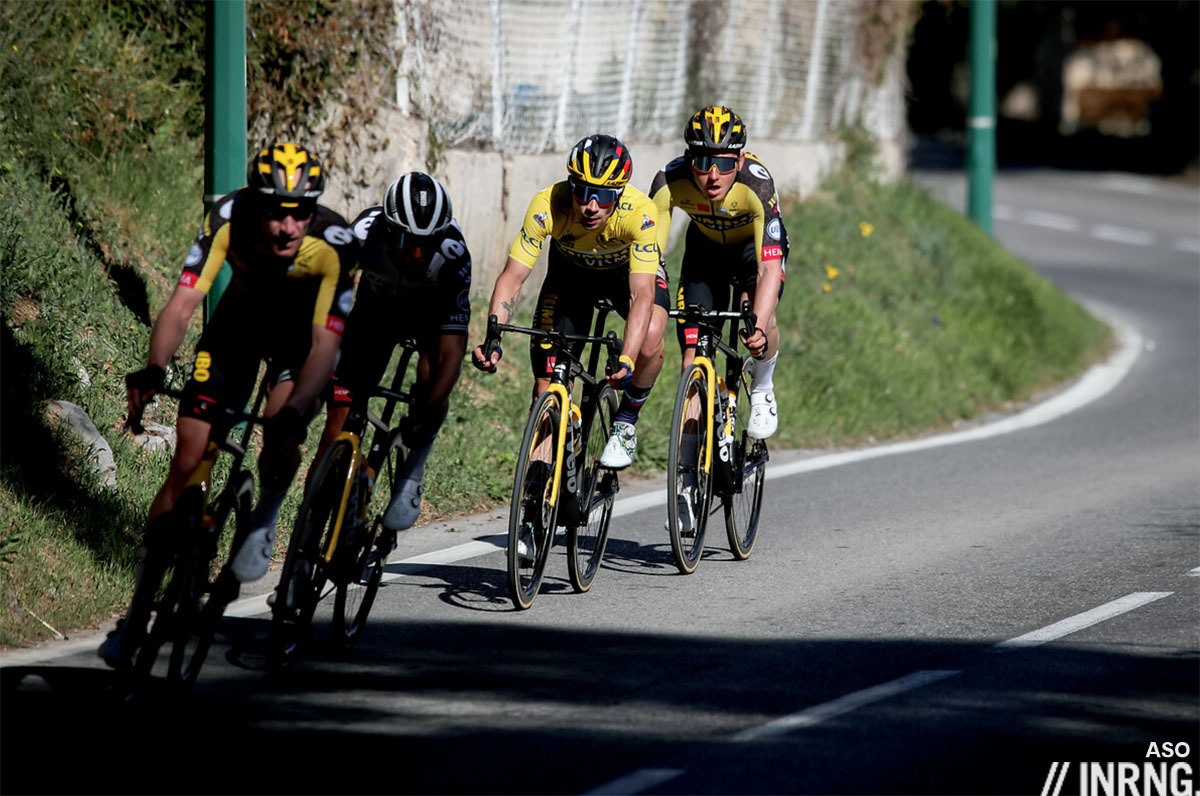
Meanwhile in France there was under an hour to go until Paris-Nice was done. Primož Roglič had survived a crash and apparently popped a dislocated shoulder back in but it still looked we’d get a battle for the stage win. Then Roglič crashed again, almost in the same place. This time just a jammed chain but the race was going faster and his team lacked a big rouleur, Tony Martin had crashed out on an earlier stage. Roglič went through his team mates and then found himself chasing alone up the Vésubie valley, briefly getting help from ejected riders like Nacer Bouhanni, micro moments but guages of his popularity in the bunch. He was within 10 seconds of the peloton but the final metres are always the hardest and Astana and Bora-Hansgrohe were driving the pace. And Roglič couldn’t close the gap. He never gave up though, climbing as fast as he could and prompting many double takes from dropped riders coasting up the last climb. Upon reaching the finish he congratulated Max Schachmann on his win with a fist-bump when by he might have felt like punching harder.
Why the highlight?
Two surprises in a day. You could pick either race but were able to enjoy them both. Van der Poel gave a masterclass in audacity while Roglič showed his tenacity, the long chase was so close but even when all was lost he kept going, overtaking plenty of dropped riders.

With hindsight
It was thrilling by Mathieu van der Poel but he went too deep and spent the following days and weeks recovering and if he was present in the cobbled classics he wasn’t the menace he could have been. He didn’t win again until the Tour de Suisse.
Pogačar’s riding kept Wout van Aert at bay and so helped wrap up the GC for the Slovenian. He was on the attack the day after he’d won the summit finish, all while van der Poel had taken it easy the previous day. So this was one of those days that Pogačar didn’t win but he showed he was ahead of the others and on the kind of mixed terrain that won him Lombardia, he doesn’t need obvious summit finishes or time trials to win a stage race although he’ll win there too. It’s this that will have riders like Egan Bernal wondering what they have to do (likely answer: take on his team, and try in the very high mountains).
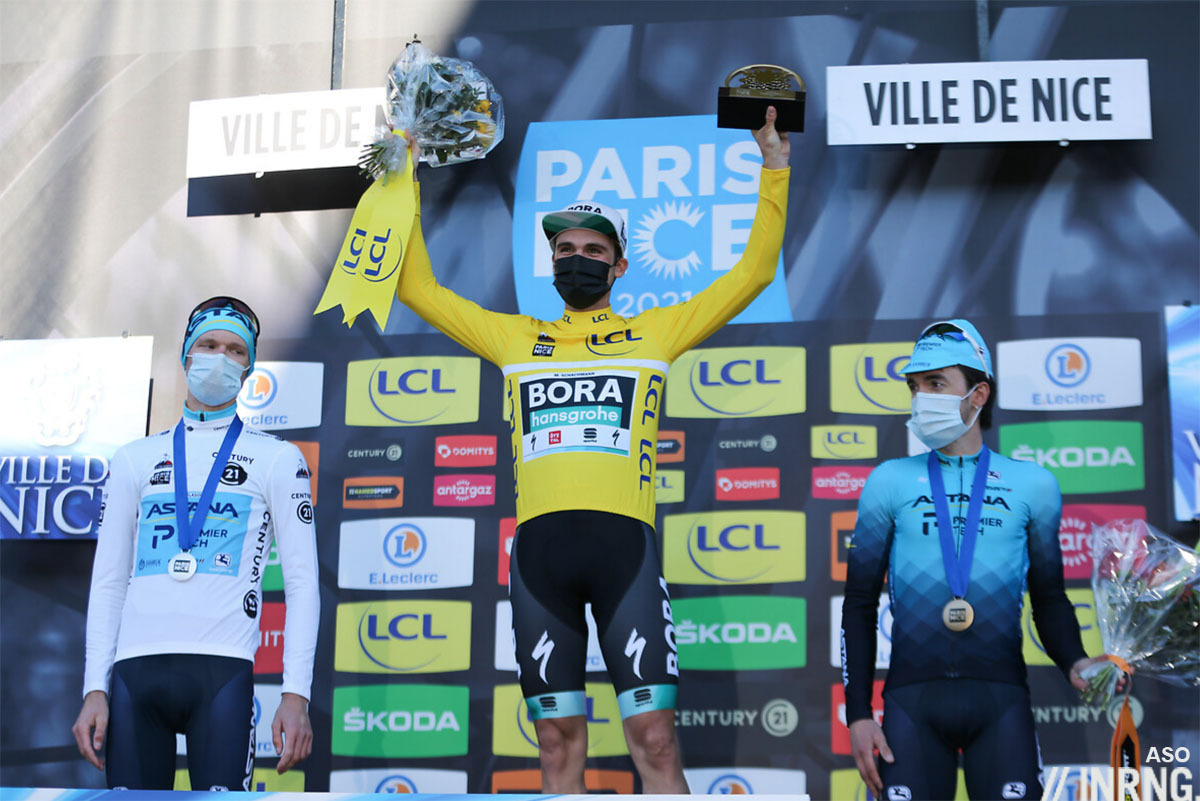
For Max Schachmann, you have to be strong to be sitting second overall and skilful not to crash, but obviously this was a win by accident. Only this was his highlight of the season. He’d won Paris-Nice in 2020 fair and square and looked set for a big season but things never worked out, Bora-Hansgrohe’s transition to a stage racing outfit is a work-in-progress.
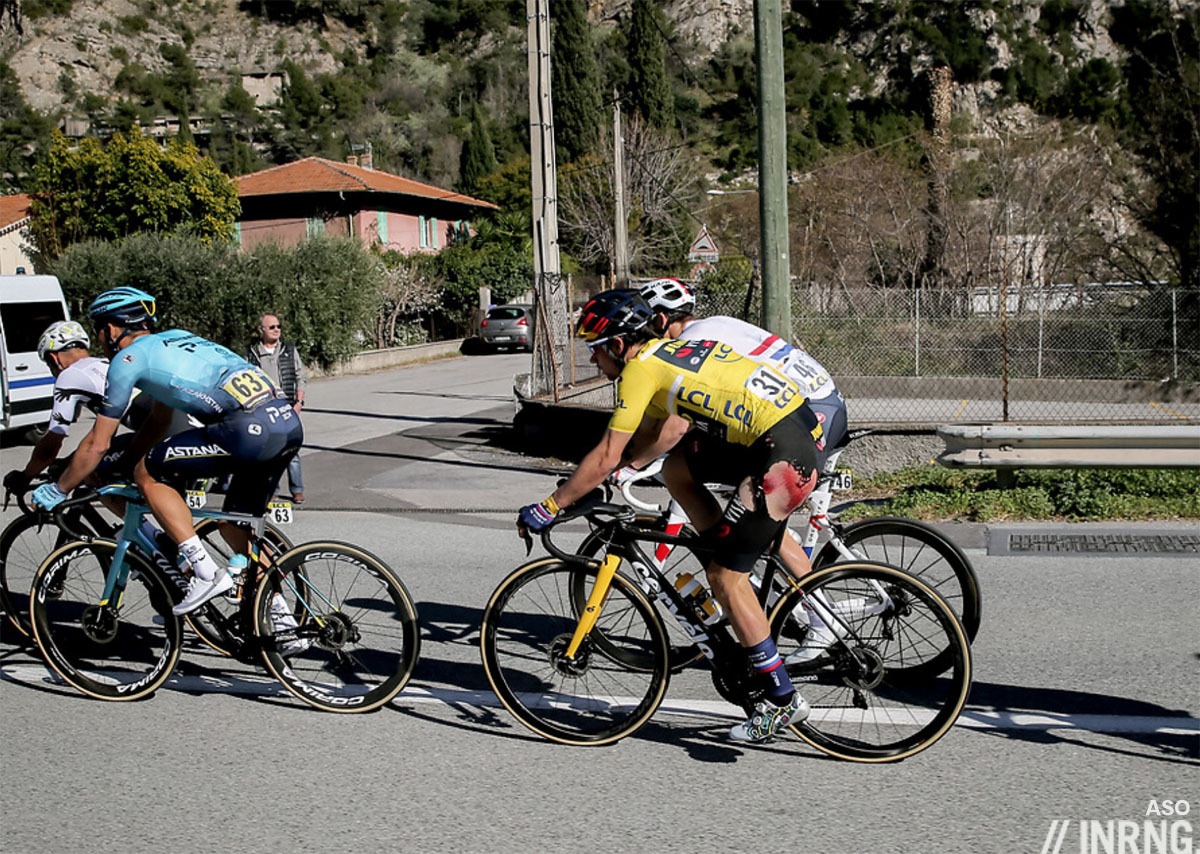
For Primož Roglič this was an emblematic ride, so much stage racing success but so far in France his biggest stage race success is the Tour de l’Ain, a nifty race and arguably the toughest edition ever but he wants a lot more. He won’t stop trying and the sight of him racing up the valley road in his shredded shorts was part of his story, racing even when beaten.
As for clashing races, they only clash if you force yourself to exclude one. While van der Poel was up the road you could channel hop; or switch browser tabs. Hire outside management consultants to reformulate the calendar and they’d hate overlapping World Tour races. But we’d get a sanitised product and fewer riders would be racing. There’s something to be said about not having all of the best riders in the same races all the time, it widens the cast of characters. Keeping Pogačar and Roglič apart can be a good thing, it heightens interest when they do clash.

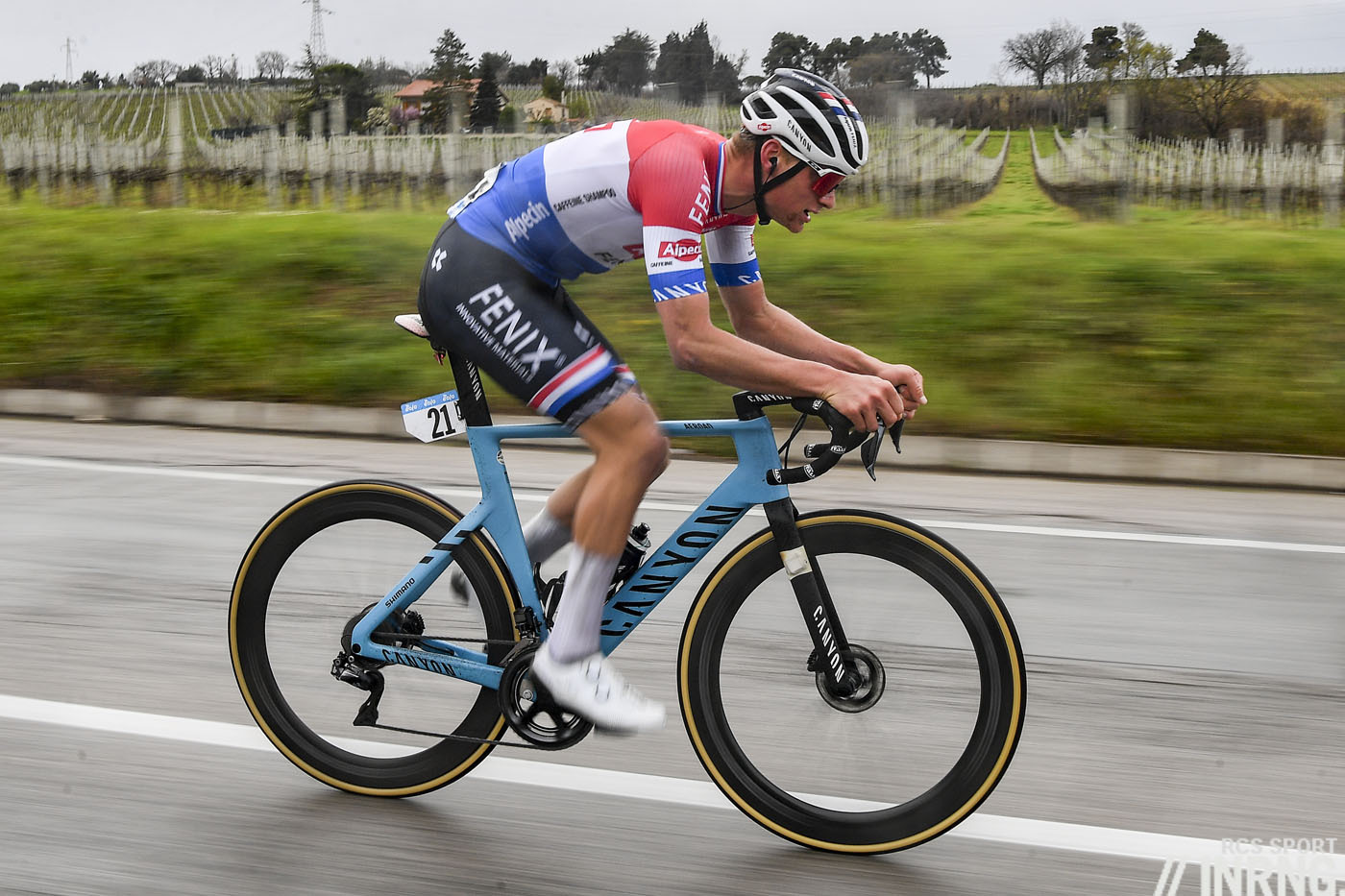
Penultimate para is curtailed: “He won’t stop trying and the sight of him racing up the valley road in his shredded shorts was” … I’m happy to use my imagination but I suspect you intended an adjective here. (Feel free to delete this comment.)
Got it, thanks
“Hire outside management consultants to reformulate the calendar and they’d hate overlapping World Tour races. But we’d get a sanitised product and fewer riders would be racing. There’s something to be said about not having all of the best riders in the same races all the time, it widens the cast of characters. Keeping Pogačar and Roglič apart can be a good thing, it heightens interest when they do clash.”
100% agree! The same people lobbying for those “outside management consultants” hold up F1 or North American sports franchises as examples of what pro cycling should become.
May it NEVER be so!
It’s a time of year when so many riders benefit from a stage race, the classics riders often want/need one and then there’s room for two fields of sprinters, climbers and stage race specialists on top.
That Tirreno stage was a great watch, but I’m wondering if either of the Vans would do it again. Both went too deep and it affected their classics campaigns. Neither a stage win or second overall at Tirreno are particularly important in the grand scheme of either of their palmares. I’d like to see Wout learn from this kind of thing.
Secondly, and I know I’ll be alone on this, MvDP’s histrionics every time he wins really get on my t… nerves. Collapsing to the floor and holding his face as if he’s never won anything before and he’s the only person who’s tired at the end of a bike race. Just saying.
Richard S- Nobody will ever hear me complain about “going too deep”. It’s a race! If you just wanna ride around for training, OK, stay out of the way of those actually racing, otherwise why not try to win? As to MVdP, you’re not alone, his antics are getting a bit old to me as well, though as he gets better and wins more important races it seems he may be toning it down or celebrating only when it’s a bigger win rather than every time?
The lost honour of the Canyon Aeroad was swiftly reclaimed though, after the travails of early March.
Ecky – Perhaps that’s supposed to be funny? But at the same time it’s like celebrating every time a plastic bike manages not to break? In US vernacular they’re “potato chip” bikes which in the UK is “crisp” I guess? I wonder how many of them a guy like MVdP goes through in a season?
I’m sure that words were had between sponsor and rider after the problems at Le Samyn.
It was / could have been a mini-PR disaster for Canyon, on the cusp of the new (buying) season.
But, yes, I think that MvdP’s prime motivation was obviously Pogacar.
If he’s prone to dramatic gestures, as Richard lays out above, what is more dramatic than laying waste to the TdF champion?
Winning Amstel Gold against all odds in front of a home crowd. Winning the Tour yellow jersey with the Poulidor story in mind. Winning Flanders after waiting for a photo finish descision. All a lot more dramatic than beating Pog in a lumpy TA stage.
You can think on his behalf and drag all the feelings of honor or whatever in there, but it could also well be a win he suffered hard for in quite bad conditions.
Jeroen, you may have misconstrued the point; MvdP pulled out a huge effort for, on the face of it, little reward other than beating Pogacar and a star-studded field in an early season stage race?
I playfully added that his sponsor may have added to the mix.
Personally, I don’t mind his post-race reactions, he’s a great cyclist and that’s good enough for me.
Richard, I’ll bite. Have you ever had the pleasure of racing to the line in miserable conditions, holding off upcoming riders on an uphill finish with legs allready more than dead? I have, in long distance MTB races and I fully understand that MvdP gives in to not wanting to stand on his legs for a bit.
What do you want him to do? Not celebrate? Keep it cool? What’s the fun of winning if you cannot visibly enjoy it? Being that tired messes up all your reactions, so don’t take them too seriously. I’m sometimes amazed that riders can give coherent interviews straight after finishing. I would have first needed some glucose to come back in my brain again.
I hate to see riders go all business like “yeah I’m this good” on the finish line. Next thing you know you’ll be posting here that it comes across as arrogance.
I don’t want to speak for Richard S, but IMHO there’s a difference between a victory celebration and histrionics. Few want a boring winner but MVdP’s been guilty of taking things to extremes in the past. My guess (hope?) is he’ll be less of a drama-queen as his career goes on?
So when did he take things to extremes?
I’m at risk of being taken for a fanboy here, but I don’t think that anyone is able to tell the difference between true joy or overacted excitement. Different people, different cultures… I don’t think Mathieu stands out a lot. Wout van Aert was on the floor after his first Strade 3rd place. He celebrated big time on Champs Elysees, in a ‘who’s the man’ pose for ages, as he should. Some riders lose it a bit after a stage win and wild team hugs are quite normal.
Maybe we’re not really used to athletes really wanting the succes anymore, despite the salaries.
Extremes? I first thought of trying to find video of MVdP’s various race wins to illustrate my point but decided it’s one of those “eye of the beholder” things. Seems you either like the histrionics or you don’t. The laying down on the ground, the holding of one’s head as if the entire thing was incredible, the getting back on his feet as if it’s a resurrection..all is a bit over the top IMHO and I think Richard S agrees. I’m actually warming up to the guy a bit after really disliking his antics in the past so I’ll leave it there 🙂
Tour Stage 21 is the Sprinters’ World Championship, definitely a victory worth celebrating.
Hi Jeroen, unfortunately no I haven’t had the pleasure of winning such a bike race. I have had the experience of riders streaming past me on an uphill finish, with my legs dead and being completely shattered at the end. But I guess nobody celebrates that.
‘What do you want him to do? Keep it cool?’ Yes, exactly that. Arms up, big smile and then carry on with your life.
I was standing next to the finish line at the `koppenbergcross when MVDP won. He collapsed on the line but believe me, there were no histrionics. He’d gone that deep he just had nothing left.
Completely agree with the last paragraph and Larry T’s comment above. I have zero doubt that after a decade following “outside management consultants” advice, we would have the best riders in the peloton riding together a bunch of desert crits in countries with lax views on human rights, while many iconic races become irrelevant and/or end up disappearing from the calendar. Not that this hasn’t happened a bit with the UCI trying to “globalize” the sport (an euphemism for selling out to dictators), but it certainly could be much, much worse.
Yes I agree with this. Compared to a lot of sports cycling has done well to hold on to a lot of its tradition. Pretty much all the big races still exist and are run on the same courses, over the same distances, at the same time of year as they always have. Perhaps you could say the gradual Vueltaization of the grand tours is a trend that should be stopped. The UCI have even resisted the temptation to have the one race they can have wherever they want, the Worlds, in ludicrous locations every year.
The UCI doesn’t really close euro races just so they can add others. It just so happens that if you have the money to run a race and somebody else does not that’s the race that’s on the calendar. You have to chase the organisations with the funding to run a race correctly regardless of whether its every-bodies favorite race. If you don’t have the funds to run a race your history. Most of the extra races occur before or after the normal calendar anyway so nobody has to make way for them.
I support efforts like the tour of Flanders making a finish loop and selling VIP positions on the hill. Its expensive to run a bike race and out of the box money raising is whats needed to keep so many European races viable.
Only, it doesn’t work exactly like that.
Sometimes historical races are actually forced to move around the calendar (Giro dell’Appenino anyone?), sometimes the excessive status in UCI points granted to new races prompts (or “prompted”, when UCI points happened to mean anything) riders to focus part of their prep on going and grabbing ’em, although that my suppose shifting away (rest, logistics, and so on) from historical races… the UCI itself sometimes financially supports some races, be it directly or indirectly, while others are left to themselves. “Requirements” are also applied in a way that’s far from homogenous.
And that’s even more apparent in women cycling, where it borders shocking.
That said, I’d also support the idea that race organisation is actually an independent part of cycling, and that gives room to sort of a fluid calendar, as many races struggle to survive and other rise – and that’s precisely how things have been… historically (see, for example, the decline of Paris-Bruxelles which mirrors the woes which Paris-Tours is going through when compared with few years ago; the Trofeo Baracchi, which I’d love to see again; or, much more recently, what happened to Criterium Internationale).
What annoys me, and many others, I guess, is when the UCI makes a mess trying to fix what’s not *that* broken – despite all the lamentations about the sport “not being financially sustainable”. Worse times were gone through, in the late 70s for example.
If creative money making is a good idea or not can normally be judged only in the middle term, when you discover if trying to squeeze more money from something ended up hurting or drying up the capacity of that object to produce value again and again.
Gabriele wrote: “What annoys me, and many others, I guess, is when the UCI makes a mess trying to fix what’s not *that* broken – despite all the lamentations about the sport “not being financially sustainable”. Worse times were gone through, in the late 70s for example.”
I thought (perhaps mistakenly?) that UCI rules prevented teams making a profit. The “financially sustainable” argument to me is hiding a profit-making element. Seems like JV and others want their WT licenses to turn into franchises that can be bought and sold, especially if they can be “grandfathered” in at no-cost to guys like JV? But if making a profit is banned by UCI, is their bigger issue getting that rule changed? There are far too many sports that have turned way-too-much into businesses IMHO so I really hate to see pro cycling head down this road.
Larry T writes “UCI rules prevented teams making a profit.”
I’d like to see something to back up this assertion.
This used to be a rule sort of about this but any team making more money than they spent could pay the owner-manager a fee and the accounts would balance. The only thing now is a team manager can’t take out expected profits, eg ride off into the sunset in March with money that’s supposed to be spent in, say, September.
The Inner Ring – so does this mean a team owner could be a plutocrat like NFL or NBA team owners and (they hope anyway) make huge profits from owning a team rather than just hoping to break-even with balanced books at the end of each season?
If anyone is currently making big money they seem to be keeping it pretty quiet as we don’t see owners of big budget teams like INEOS, UAE, etc. flaunting any wealth.
You could try to run a team this way but it would be hard to get rich. You’d spend a lot to get the team going and then have to fund the budget and hope for a return each year above your costs. But good like making a million or two more than your, say, 30 million euro annual budget and you’d want to set aside some of that in case a sponsor quits or something else goes wrong. Still some team managers do seem to make a decent living from their team, the trick is to keep it on the road each year.
Wout Van Aert said of MVDP (after Namur 2020) “it’s a great quality of his to be able to go way beyond his limit. I’m capable of riding a very good final, too, but sometimes he’s just a little bit stronger.” I bring this up NOT to talk about who’s BETTER, Rather to suggest that the dramatic, head-holding, on the ground collapses by MVDP after some wins maybe really just what they appear on the surface to be — physical breakdowns by a guy who sometimes wins by COMPLETELY emptying the tank. That Tirreno-Adriatico stage ruined van der Poel’s classics campaign, wrecked him. It was stupid and reckless and he paid a massive price for it. You can criticize his judgement all day long, but given what it did to him do you REALLY think he was FAKING that collapse? Does that make sense? Or is he just a guy who rides impulsively and from time to time utterly destroys himself for a win?
“…maybe really just what they appear on the surface to be —” You are right when you write MAYBE as in possibly or perhaps. Or MAYBE they’re just histrionics. Just like claiming “That Tirreno-Adriatico stage ruined van der Poel’s classics campaign, wrecked him. ” Nobody knows unless MVdP told them that was the case. Is there a quote from him explaining this? Otherwise you don’t KNOW what it did to him, instead you like to believe he “rides impulsively and from time to time utterly destroys himself for a win?” which is fine with me, everyone is entitled to their own opinion whether there are any facts to back it up or not.
I’d agree that the actual effect of that sort of attacks isn’t necessarily a wreck, and MvdP didn’t look that bad at Flandres, either – he just met a superlative Asgreen (while surely he looked a bit toasted at the Sanremo).
Positive interpretations about it in terms of training and form have been offered, for example, by Davide Cassani with a number of legitimate examples; but he wasn’t the only one, either ( https://www.velonews.com/news/road/analysis-why-is-mathieu-van-der-poel-attacking-from-so-far-out/ ).
That said, as I commented below, I doubt that MdvP hadn’t actually emptied his tank at Tirreno’s stage 5 (or at the Amstel). We’ve got both figures and experience to prove that if he wasn’t on the limit on such a ride… well, he’d be well beyond what humans have been shown on a bike for quite a long time.
“,,,well, he’d be well beyond what humans have been shown on a bike for quite a long time.”
So he’s either the only guy who wants to win that badly…or something else which I don’t even want to think about? This is starting to remind me of the guy who claimed Marco Pantani had some sort of persecution complex because of the finish-line photos of him raising his arms…taken when his arms were outstretched as if he was being crucified.
Quick Mr. Inrng, put up Part III! 🙂
“So he’s either the only guy who wants to win that badly…or something else which I don’t even want to think about?”
No.
Humm, Larry, think a little more about it. He’s not *the only one*, he just happened to pull out an exceptional effort, and quite obviously so, then finding himself exhausted like I remember, dunno, random picks… Cancellara, Degenkolb, Ruth Winder, Schachmann, Tony Martin, Chaves… and they’re not exactly the sort of people I think about when the word “histrionics” comes up.
Whereas to defend your “histrionics” theory, you need to suppose that he wasn’t actually that spent.
Oh well, so, why don’t these guys produce this sort of performance more often, given that it comes so easy for ’em, they also have time and a cold head to act up, let the time difference go down to 10 secs while keeping the win safe and all that… sure… let’s speak of “MAYBEs”, but let’s speak of probabilities also.
I think that what happened I Flanders is that Asgreen outsmarted MvdP with a taller gear for the sprint.
Van der Poel ride was an epic one. We’ve been treated to some in recent years, and not only by this guy, for sure, yet to question his behaviour after the line when speaking of a day like this… to me, it just looks a little out of context, albeit I understand that commenters here are speaking of a more general trend. That said, I feel that precisely at the end of this Tirreno stage – just after that Amstel – the athlete didn’t just *look* spent, and even less so did he flaunt any fake exhaustion: he simply went way deeper than we’re now used to see in a cycling road race. We don’t see much often this sort of things, indeed.
Here MVDP deliberately decided not only to go for a win but to go for a show, and not at all that sort of show which comes cheap, like whatever winning antics you could decide to pull out once crossed the finish line. He went alone after some already quite hard 150 kms in stern weather, when more than 50 were left to the line – and he had to attack hard in order to do so. *Half a dozen walls* were yet to be tackled.
The fact that this wasn’t perhaps the only option he had to win, or the question marks about how else could he actually maximise his winning chances, only add to the tactical intrigue.
He couldn’t relax for a single moment, given that behind the chase was animated by some of the *absolute best athletes* now competing in pro cycling, all of them in glittering form: Pogacar, Van Aert, Bernal (the likes of Wellens, Almeida, Landa, Bardet, Nibali, Van Avermaet, Quintana, Yates etc. were just the icing on the cake – Alaphilippe who was winning stages and duelling with the best in uphill sprints two days earlier just blew and came home 20′ later).
As in Strade Bianche, we got an excellent field where côtes-puncheurs, cobbles-hard-men and GC specialists faced each other.
The selection prompted by this sort of riding style was brutal: less than 20 athletes were able to keep their time difference on the line under the 5 minutes (!) mark. Only 3 athletes crossed the line before 2 minutes had passed. And yet, Pogacar was so near and riding so hard that van der Poel had to really give his all until the very last metre. Many Queen Stages at the Tour de France don’t come even close to that sort of selection. To find as a selective *Paris-Roubaix* we’d need to go ten years back to the Boonen-Cancellara duels.
After collapsing to the ground, Van der Poel didn’t resurrect so swiftly, actually. I really doubt he was faking anything at all, and whatever exhibition of joy to me wasn’t less than justified.
The only explication I can find to people being so picky about the celebration or so is that they didn’t fully understand the sort of performance they were watching – we’ve become less and less used to this approach to racing, to the point that we don’t appreciate its status. Truth is that “the entire thing is incredible”, and MDVP’s got all the right to hold his head!
Again: I’m not speaking of *every* MDVP victory, and perhaps not every celebration is as deserved, but *this* stage is what we’re speaking of. And several others of his victories can well be added to the list of “just celebrate or whatever as you please, because it’s as justified as it can get”.
“…but *this* stage is what we’re speaking of. ” WRONG! Richard S started this thread with: “MvDP’s histrionics every time he wins really get on my t… nerves” so what you are arguing is far from the same thing. I love to argue as much as the next guy but I suggest you try to argue with what was actually posted, OK?
Which thread? Mine was a direct comment to the original inrng’s post.
Please read throughout from start:
“to question his behaviour after the line when speaking of a day like this… to me, it just looks a little out of context, albeit I understand that commenters here are speaking of a more general trend”.
That is, the main subject of this inrng’s post is a very specific day, on which little to no doubt can be raised about the guy being indeed worn out to the bone – so, some commenters find that precisely *this* is the most appropriate occasion to point out that, somewhere else, MVDP is supposedly acting? Weird.
All that, while, as many other pointed out, this athlete actually often goes to his very limit or beyond. As many other cyclists do on a given day, by the way – then duly falling to the ground holding their heads, at the end of the process.
If anything, I’m left more perplexed by the sort of attitude shown albeit jokingly in the other stage won by MDVP. But, again, perhaps that’s not the most pertinent subject here.
OK, fair enough. I’ll charge Mr. Inrng with proclaiming “he went too deep and spent the following days and weeks recovering” but I take his entire blog as his opinion rather than fact so I won’t beat up on him too much, though I question the idea a pro of this level’s recovery powers are so quickly (and for so long) wiped out by an effort like that.
Errata corrige: “just AS after that Amstel”
Even before MVDP came to road cycling i was excited about his entry to the scene and he is clearly my favorite rider now and ultra exiting to watch like no other rider. As to who is better between him and WVA. Well neither. They are different. MVDP has the big power and WVA is lighter and climbs better and probably time trials better.
One is on a small team which is setup to give him the best backup they can afford. The other is on a big team not setup to support him but has great support nevertheless (but consistently blow themselves up to early and give no support at the end of the race).
MVDP at times seems to bully / surge to hard and the other riders let /force him do all the work. He if wants to win more he needs to be a bit more patient and work with the other riders. But would he still be MVDP if he did that. MVDP could perhaps stand to be sprinting in a bigger gear as he seems to get outsprinted when he is maxed out for cadence sort of like he is doing a cross sprint when everybody else is doing a high speed road sprint.
There is the rivalry between the two, exaggerated or not, but as you explain they’re different riders, capable of racing each other on some terrain but not everywhere.
One small interest is just seeing classics riders going at it in the Tour, it makes the flat stages less processional. We’ve gotten used to plenty of riders, from Boonen to Sep Vanmarcke just not riding the Tour in recent years.